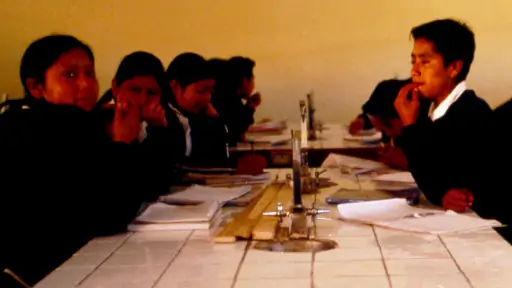Indigenous Calendar May, 2018: Kiss It Good-bye

Forty-one years ago the musical band, The Eagles, reminded us that once we call a place 'paradise,' we may as well "kiss it good-bye." For hundreds of years indigenous people have been kissing good-bye to their paradise. The argument could be made — and of course it sometimes is — that indigenous people have benefited in that time by having their societies replaced by a culture based on science. Without such change it is unlikely that I would have found these indigenous Tzeltal Maya children in a science class at their school in Chiapas, Mexico — or is it?
We recently said good-bye to Stephen Hawking. Long before cable TV and popular culture created "rockstar scientists," Hawking was doing what scientists do — pursuing the fact that even the most seemingly difficult questions are open to scientific inquiry and, eventually, answer. Known better to the rest of us for popularizing and simplifying the inaccessible realms of theoretical physics and astrophysics, he was known to his peers as a brilliant scientist ahead of his time. Had any of his theoretical predictions been confirmed empirically sooner than was possible, he would no doubt have been awarded the Nobel Prize in Physics. That it was awarded last year for empirical confirmation of predictions by Albert Einstein over a hundred years previously is sound testament indeed.
These days hardly a week goes by without some major science news story emerging. Looking back into just the recent past we saw the publication of a 3D map of most of our own galaxy and the ability of artificial intelligence algorithms to outsmart humans with no human expert input.
"Kiss it good-bye" is a quote from The Eagles' song, The Last Resort. The song chronicles, among other things, the destruction of indigenous culture as European colonizers migrated to the west coast of North America. "There is no more new frontier./We have got to make it here" it proclaims of one of the settlers' final destinations, California.
When it comes to science, though, there are always new frontiers. Its status as a work-in-progress is a strength, not a weakness. That was understood by the ancient Maya as well as it was by Hawking. Ironically, they were far more advanced in their scientific understanding than were their European colonizers. The importance of science is revealed by science: if we kiss it good-bye we may as well kiss good-bye to our survival.
The Tzeltal Maya are featured in our documentary, Ancient and Modern Mayan Peoples.
Read more about the Tzeltal Maya People.
If you enjoyed reading this article, please consider supporting independent, advertising-free journalism by buying us a coffee to help us cover the cost of hosting our web site. Please click on the link or scan the QR code. Thanks!


